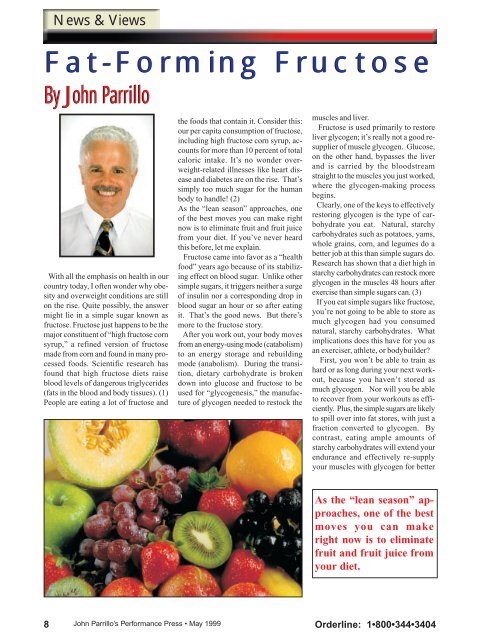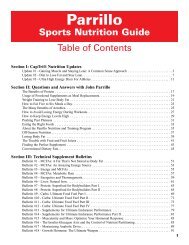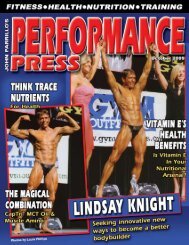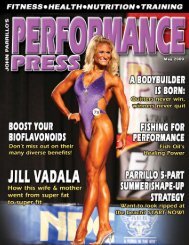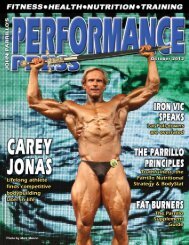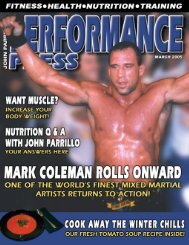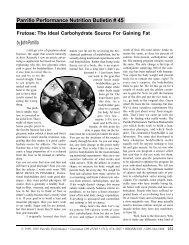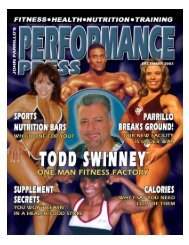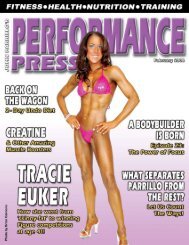John Parrillo'sJohn Parrillo's - Parrillo Performance
John Parrillo'sJohn Parrillo's - Parrillo Performance
John Parrillo'sJohn Parrillo's - Parrillo Performance
You also want an ePaper? Increase the reach of your titles
YUMPU automatically turns print PDFs into web optimized ePapers that Google loves.
News & Views<br />
Fat-Forming Fructose<br />
By <strong>John</strong> <strong>Parrillo</strong><br />
With all the emphasis on health in our<br />
country today, I often wonder why obesity<br />
and overweight conditions are still<br />
on the rise. Quite possibly, the answer<br />
might lie in a simple sugar known as<br />
fructose. Fructose just happens to be the<br />
major constituent of “high fructose corn<br />
syrup,” a refined version of fructose<br />
made from corn and found in many processed<br />
foods. Scientific research has<br />
found that high fructose diets raise<br />
blood levels of dangerous triglycerides<br />
(fats in the blood and body tissues). (1)<br />
People are eating a lot of fructose and<br />
the foods that contain it. Consider this:<br />
our per capita consumption of fructose,<br />
including high fructose corn syrup, accounts<br />
for more than 10 percent of total<br />
caloric intake. It’s no wonder overweight-related<br />
illnesses like heart disease<br />
and diabetes are on the rise. That’s<br />
simply too much sugar for the human<br />
body to handle! (2)<br />
As the “lean season” approaches, one<br />
of the best moves you can make right<br />
now is to eliminate fruit and fruit juice<br />
from your diet. If you’ve never heard<br />
this before, let me explain.<br />
Fructose came into favor as a “health<br />
food” years ago because of its stabilizing<br />
effect on blood sugar. Unlike other<br />
simple sugars, it triggers neither a surge<br />
of insulin nor a corresponding drop in<br />
blood sugar an hour or so after eating<br />
it. That’s the good news. But there’s<br />
more to the fructose story.<br />
After you work out, your body moves<br />
from an energy-using mode (catabolism)<br />
to an energy storage and rebuilding<br />
mode (anabolism). During the transition,<br />
dietary carbohydrate is broken<br />
down into glucose and fructose to be<br />
used for “glycogenesis,” the manufacture<br />
of glycogen needed to restock the<br />
muscles and liver.<br />
Fructose is used primarily to restore<br />
liver glycogen; it’s really not a good resupplier<br />
of muscle glycogen. Glucose,<br />
on the other hand, bypasses the liver<br />
and is carried by the bloodstream<br />
straight to the muscles you just worked,<br />
where the glycogen-making process<br />
begins.<br />
Clearly, one of the keys to effectively<br />
restoring glycogen is the type of carbohydrate<br />
you eat. Natural, starchy<br />
carbohydrates such as potatoes, yams,<br />
whole grains, corn, and legumes do a<br />
better job at this than simple sugars do.<br />
Research has shown that a diet high in<br />
starchy carbohydrates can restock more<br />
glycogen in the muscles 48 hours after<br />
exercise than simple sugars can. (3)<br />
If you eat simple sugars like fructose,<br />
you’re not going to be able to store as<br />
much glycogen had you consumed<br />
natural, starchy carbohydrates. What<br />
implications does this have for you as<br />
an exerciser, athlete, or bodybuilder?<br />
First, you won’t be able to train as<br />
hard or as long during your next workout,<br />
because you haven’t stored as<br />
much glycogen. Nor will you be able<br />
to recover from your workouts as efficiently.<br />
Plus, the simple sugars are likely<br />
to spill over into fat stores, with just a<br />
fraction converted to glycogen. By<br />
contrast, eating ample amounts of<br />
starchy carbohydrates will extend your<br />
endurance and effectively re-supply<br />
your muscles with glycogen for better<br />
As the “lean season” approaches,<br />
one of the best<br />
moves you can make<br />
right now is to eliminate<br />
fruit and fruit juice from<br />
your diet.<br />
8 <strong>John</strong> <strong>Parrillo</strong>’s <strong>Performance</strong> Press • May 1999 Orderline: 1•800•344•3404


